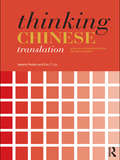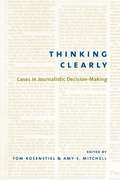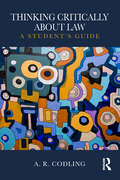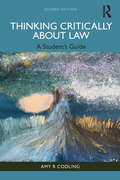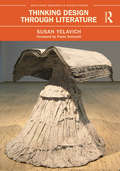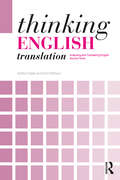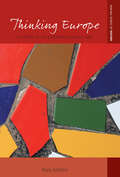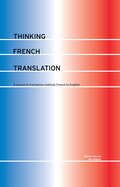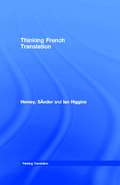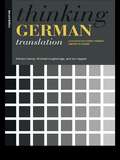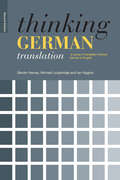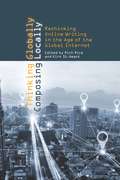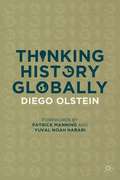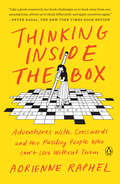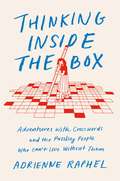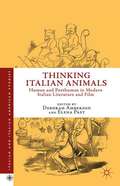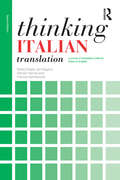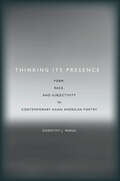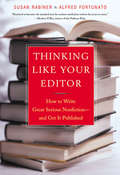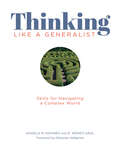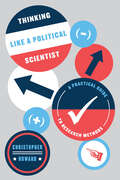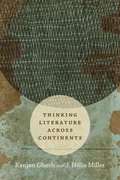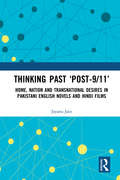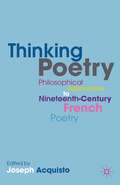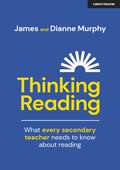- Table View
- List View
Thinking Chinese Translation: Chinese to English
by Valerie Pellatt Eric T. LiuThinking Chinese Translation is a practical and comprehensive course for advanced undergraduates and postgraduate students of Chinese. Thinking Chinese Translation explores the ways in which memory, general knowledge, and creativity (summed up as ‘schema’) contribute to the linguistic ability necessary to create a good translation. The course develops the reader’s ability to think deeply about the texts and to produce natural and accurate translations from Chinese into English. A wealth of relevant illustrative material is presented, taking the reader through a number of different genres and text types of increasing complexity including: technical, scientific and legal texts journalistic and informative texts literary and dramatic texts. Each chapter provides a discussion of the issues of a particular text type based on up-to-date scholarship, followed by practical translation exercises. The chapters can be read independently as research material, or in combination with the exercises. The issues discussed range from the fine detail of the text, such as punctuation, to the broader context of editing, packaging and publishing translations. Major aspects of teaching and learning translation, such as collaboration, are also covered. Thinking Chinese Translation is essential reading for advanced undergraduate and postgraduate students of Chinese and translation studies. The book will also appeal to a wide range of language students and tutors through the general discussion of the principles and purpose of translation.
Thinking Clearly: Cases in Journalistic Decision-Making
by Tom Rosenstiel Amy MitchellWritten by leading professional journalists and classroom-tested at schools of journalism, Thinking Clearly is designed to provoke conversation about the issues that shape the production and presentation of the news in the twenty-first century. These case studies depict real-life moments when people working in the news had to make critical decisions. Bearing on questions of craft, ethics, competition, and commerce, they cover a range of topics—the commercial imperatives of newsroom culture, standards of verification, the competition of public and private interests, including the question of privacy—in a variety of key episodes: Watergate, the Richard Jewell case, John McCain's 2000 presidential campaign, and the Columbine shooting, among others.
Thinking Critically About Law: A Student's Guide
by A. R. CodlingSo you’ve arrived at university, you’ve read the course handbook and you’re ready to learn the law. But is knowing the law enough to get you the very best marks? And what do your lecturers mean when they say you need to develop critical and analytical skills? When is it right to put your own views forward? What are examiners looking for when they give feedback to say that your work is too descriptive? This book explores what it means to think critically and offers practical tips and advice for students to develop the process, skill and ability of thinking critically while studying law. The book investigates the big questions such as: What is law? and What is ‘thinking critically’? How can I use critical thinking to get better grades in assessments? What is the role of critical thinking in the work place? These questions and more are explored in Thinking Critically About Law. Whether you have limited prior experience of critical thinking or are looking to improve your performance in assessments, this book is the ideal tool to help you enhance your capacity to question, challenge, reflect and problematize what you learn about the law throughout your studies and beyond.
Thinking Critically About Law: A Student's Guide
by Amy R CodlingYou arrive at university to embark upon your journey to ‘think like a lawyer’, but is simply knowing the law enough to gain you the best marks? What do you need to do, exactly, to achieve a first-class law degree and promising professional career? For top marks, what do your lecturers mean when they say you need to deepen your ‘critical analysis’ to answer assessment questions? When should you put your own viewpoints forward? When, and how, should you draw upon the work of others? What do your examiners mean when they give you feedback saying that your work is ‘too descriptive’? This book explores what it means to think critically and offers practical tips and advice for students to develop the process, skill and ability of thinking critically while studying law, as well as beyond that in the workplace.The second edition of Thinking Critically About Law utilises art, music, poetry and prose to explore essential questions about studying law and what it means to think critically, offering practical tips and advice for students looking to develop critical thinking skills in relation to law. Updates reflect seismic changes that have taken place both in law teaching and in society more generally. These include the Covid-19 pandemic, social movements sparked by the murders of murders of Sarah Everard and George Floyd, moves to decolonise the law curriculum and the introduction of the SQE qualification. There is also an innovative foreword by Professor Russell Sandberg, a new chapter on the topic of how to think critically during discussions, a new section on Thinking Critically About Law in the Future as well as a renewed emphasis on the health and well-being of students. Other student-focused resources will be available as support materials.Thinking Critically about Law is a crucial companion for those studying law at A-Level and undergraduate level, as well as being relevant to postgraduate students, newly qualified lawyers and tutors of law.
Thinking Design Through Literature (Routledge Research in Design Studies)
by Susan YelavichThis book deploys literature to explore the social lives of objects and places. The first book of its kind, it embraces things as diverse as escalators, coins, skyscrapers, pottery, radios, and robots, and encompasses places as various as home, country, cities, streets, and parks. Here, fiction, poetry, and literary non-fiction are mined for stories of design, which are paired with images of contemporary architecture and design. Through the work of authors such as César Aires, Nicholson Baker, Lydia Davis, Orhan Pamuk, and Virginia Woolf, this book shows the enormous influence that places and things exert in the world.
Thinking English Translation: Analysing and Translating English Source Texts (Thinking Translation)
by Stella Cragie Ann PattisonThinking English Translation is a practical guide to analysing and translating English source texts. Section I focuses on pre-translation analysis where students are guided to consider the features of a variety of English texts and the various implications for translation into other languages. Section II examines language variety in English in more detail and provides strategies for dealing with translation challenges in a wide range of text types. Thinking English Translation gives students a framework for a better understanding of how to approach source texts in order to tackle translation assignments, whether in class or in the workplace, with confidence. Stella Cragie a Qualified Member of the Institute of Translation and Interpreting, and former Principal Lecturer in Translation at the University of Westminster, is now a freelance translator. Ann Pattison is a former Senior Lecturer in Translation at the University of Westminster and now works as a freelance translator, editor and writer.
Thinking Europe: A History of the European Idea since 1800 (Making Sense of History #46)
by Mats AndrénPresenting a new historical narrative on European integration and identity this title examines how the concept of Europe has been entangled in a dynamic and dramatic tension between calls for unity and arguments for borders and division. Through an in-depth intellectual history of the idea of Europe, Mats Andren interrogates the concept of integration and more recent debates surrounding European identity across the nineteenth and early twentieth centuries and the post-war period. Applying a broad range of original sources this unique work will be key reading for students and researchers studying European History, European Studies, Political History and related fields.
Thinking French Translation (Thinking Translation)
by Ian Higgins Sándor HerveyThe new edition of this popular course in translation from French into English offers a challenging practical approach to the acquisition of translation skills, with clear explanations of the theoretical issues involved. A variety of translation issues are considered including:*cultural differences*register and dialect*genre*revision and editing.The course now covers texts from a wide range of sources, including:*journalism and literature*commercial, legal and technical texts*songs and recorded interviews.This is essential reading for advanced undergraduates and postgraduate students of French on translation courses. The book will also appeal to wide range of language students and tutors.A tutors' handbook offering invaluable guidance on how to use the text is available for free download at http://www.routledge.com/cw/thinkingtranslation/
Thinking French Translation: A Course In Translation Method-french To English (Thinking Translation)
by Ian Higgins Sándor HerveyThe new edition of this popular course in translation from French into English offers a challenging practical approach to the acquisition of translation skills, with clear explanations of the theoretical issues involved. A variety of translation issues are considered including:*cultural differences*register and dialect*genre*revision and editing.The course now covers texts from a wide range of sources, including:*journalism and literature*commercial, legal and technical texts*songs and recorded interviews.This is essential reading for advanced undergraduates and postgraduate students of French on translation courses. The book will also appeal to wide range of language students and tutors.
Thinking German Translation: A Course in Translation Method (Thinking Translation)
by Ian Higgins Sándor Hervey Michael Loughridge Mr Ian HigginsThinking German Translation is a comprehensive and revolutionary 20-week course in translation method offering a challenging and entertaining approach to the acquisition of translation skills. It has been fully and successfully piloted at the University of St.Andrews.Translation is presented as a problem-solving discipline. Discussion, examples and a full range of exercise work enable students to acquire the skills necessary for a broad range of translation problems.Examples are drawn from a wide variety of material from technical and commercial texts to poetry and song.Thinking German Translation is essential reading for advanced undergraduates and postgraduate students of German. The book will also appeal to a wide range of languages students and tutors through the general discussion of principles, purposes and practice of translation.
Thinking German Translation: Teacher's Handbook (Thinking Translation)
by Ian Higgins Sandor Hervey Michael LoughridgeThis is a comprehensive practical course in translation for advanced students of German, which focuses on improving translation quality whilst clarifying the theoretical issues involved. This second edition brings the course up-to-date, and has been fully reworked to give clearer explanations of key terms and include revised chapters on genre, compensation and revision and editing. Based on detailed analysis of translation problems, Thinking German Translation features new material taken from a wide range of sources, including: business and politics press and publicity engineering tourism literary and consumer-oriented texts. Addressing a variety of translation issues such as cultural difference, register and dialect, Thinking German Translation is essential reading for all students wishing to perfect their translation skills. It is also an excellent foundation for those considering a career in translation. Further resources, including a free teacher's handbook for the course, are available on the companion website at http://cw.routledge.com/textbooks/0415341469/resources/default.asp
Thinking Globally, Composing Locally: Rethinking Online Writing in the Age of the Global Internet (G - Reference, Information And Interdisciplinary Subjects Ser.)
by Rich RiceThinking Globally, Composing Locally explores how writing and its pedagogy should adapt to the ever-expanding environment of international online communication. Communication to a global audience presents a number of new challenges; writers seeking to connect with individuals from many different cultures must rethink their concept of audience. They must also prepare to address friction that may arise from cross-cultural rhetorical situations, variation in available technology and in access between interlocutors, and disparate legal environments. The volume offers a pedagogical framework that addresses three interconnected and overarching objectives: using online media to contact audiences from other cultures to share ideas; presenting ideas in a manner that invites audiences from other cultures to recognize, understand, and convey or act upon them; and composing ideas to connect with global audiences to engage in ongoing and meaningful exchanges via online media. Chapters explore a diverse range of pedagogical techniques, including digital notebooks designed to create a space for active dialogic and multicultural inquiry, experience mapping to identify communication disruption points in international customer service, and online forums used in global distance education. Thinking Globally, Composing Locally will prove an invaluable resource for instructors seeking to address the many exigencies of online writing situations in global environments. Contributors: Suzanne Blum Malley, Katherine Bridgman, Maury Elizabeth Brown, Kaitlin Clinnin, Cynthia Davidson, Susan Delagrange, Scott Lloyd Dewitt, Amber Engelson, Kay Halasek, Lavinia Hirsu, Daniel Hocutt, Vassiliki Kourbani, Tika Lamsal, Liz Lane, Ben Lauren, J. C. Lee, Ben McCorkle, Jen Michaels, Minh-Tam Nguyen, Beau S. Pihlaja, Mª Pilar Milagros, Cynthia L. Selfe, Heather Turner, Don Unger, Josephine Walwema
Thinking History Globally
by Diego OlsteinThinking History Globally means thinking about the past and the present beyond national borders, language barriers, and enclosed regions. There are four thinking strategies to gain global perspectives: comparing, connecting, conceptualizing, and contextualizing. Comparing is about contrasting between several cases and drawing new conclusions. Connecting is tracking the interdependences between cases and assessing their importance. Conceptualizing is recognizing that developments in one or several cases belong within a larger recurring pattern. Contextualizing is making sense of one case amidst developments world-wide. This book offers a practical guide into these strategies of thinking by applying them to multiple historical cases, ranging from the first civilizations and up to the First World War. While doing that, Olstein also presents the twelve branches of history that outstand in the application of these four strategies and in thinking history globally: comparative, relational, international, transnational, oceanic, global, world, and big histories, historical sociology, civilizational analysis, world-system approach, and history of globalization.
Thinking Inside the Box: Adventures with Crosswords and the Puzzling People Who Can't Live Without Them
by Adrienne RaphelA delightful, erudite, and immersive exploration of the crossword puzzle and its fascinating history by a brilliant young writerAlmost as soon as it appeared, the crossword puzzle had already become indispensable to our lives. Invented practically by accident in 1913, when a newspaper editor at the New York World was casting around for something to fill empty column space, it became a roaring commercial success practically overnight. Ever since then, the humble puzzle--consisting of a grid of blank squares in which solvers write answers in response to clues--has been an essential ingredient of any newspaper worth its salt. The puzzle's daily devotees include everyone from subway riders looking to pass the time to cultural icons such as Martha Stewart, Bill Clinton, and Yo-Yo Ma. Today, its popularity is greater than ever, even as the media world has undergone a perilous digital transformation. But why, exactly, are the crossword's satisfactions so sweet that it is a fixture of breakfast tables, nightstands, and commutes, and has even given rise to competitive crossword tournaments? There are mysteries beyond the clues.Blending first-person reporting from the world of crosswords with a delightful telling of its rich literary history, Adrienne Raphel dives into the secrets of this classic pastime. At the annual American Crossword Puzzle Tournament, she rubs shoulders with elite solvers of the world; aboard a crossword- themed cruise, she picks the brains of the enthusiasts whose idea of a good time is a week on the high seas with nothing but crosswords to do; and, visiting the home and office of Will Shortz, New York Times crossword editor and NPR's official "Puzzlemaster," she goes behind the scenes to see for herself how America''s gold standard of puzzles is made.As ingenious as it is fun, Thinking Inside the Box is a love letter not just to the abiding power of the crossword but to the infinite joys and playful possibilities of language itself. This book will be a treat for die-hard cruciverbalists and first-time solvers alike.
Thinking Inside the Box: Adventures with Crosswords and the Puzzling People Who Can't Live Without Them
by Adrienne Raphel'Beautifully researched account, full of humour and personal insight'David Crystal, author of Making Sense: The Glamorous Story of English Grammar'A witty, wise, and wonderfully weird journey that will change the way you think . . . This book is a delight'Bianca Bosker, author of Cork Dork: A Wine-Fueled Adventure Among the Obsessive Sommeliers, Big Bottle Hunters, and Rogue Scientists Who Taught Me to Live for Taste'Delightfully engrossing, charmingly and enthusiastically well-written history of the crossword puzzle' Benjamin Dreyer, author of Dreyer's English: An Utterly Correct Guide to Clarity and Style 'Full of treasures, surprises and fun . . . richly bringing to life the quirky, obsessive, fascinating characters in the crossword world' Mary Pilon, author of The Monopolists: Obsession, Fury, and the Scandal Behind the World's Favorite Board Game 'A gold mine of revelations. If there is a pantheon of cruciverbalist scholars, Adrienne Raphel has established herself squarely within it'Mary Norris, author of Between You & Me: Confessions of a Comma QueenEqual parts ingenious and fun, Thinking Inside the Box is a love letter to the infinite joys and playful possibilities of language, a treat for die-hard cruciverbalists and first-time crossword solvers alike.The crossword is a feature of the modern world, inspiring daily devotion and obsession from millions. It was invented in 1913, almost by accident, when an editor at the New York World was casting around for something to fill some empty column space for that year's Christmas edition. Almost overnight, crosswords became a phenomenal commercial success, and have been an essential ingredient of any newspaper worth its salt since then. Indeed, paradoxically, the popularity of crosswords has never been greater, even as the world of media and newspapers, the crossword's natural habitat, has undergone a dramatic digital transformation. But why, exactly, are the satisfactions of a crossword so sweet that over the decades they have become a fixture of breakfast tables, bedside tables and commutes, and even given rise to competitive crossword tournaments?Blending first-person reporting from the world of crosswords with a delightful telling of the crossword's rich literary history, Adrienne Raphel dives into the secrets of this classic pastime. At the annual American Crossword Puzzle Tournament, she rubs shoulders with elite solvers from all over the world, doing her level best to hold her own; aboard a crossword-themed cruise she picks the brains of the enthusiasts whose idea of a good time is a week on the high seas with nothing to do but crosswords; and, visiting the home and office of Will Shortz, New York Times crossword puzzle editor and US National Public Radio's official Puzzlemaster, she goes behind the scenes to see for herself how the world's gold standard of puzzles is made.
Thinking Italian Animals
by Deborah Amberson Elena PastSituated on the cutting edge of scholarship in a variety of fields, this bracing volume draws together essays on Italian writers and filmmakers whose work engages with nonhuman animal subjectivity. Analyzing works from unification to the present, they address three major strands of current philosophical thought: the perceived borders between man and nonhuman animals, historical and fictional crises facing humanity, and human entanglement with the nonhuman and material world. These essays are driven by philosophical, theoretical, and ethical questions that interrogate Italian cultural production in provocative new ways, and their analysis has implications not simply for Italianists, but for a range of scholars doing work within cross-disciplinary fields such as animal studies, ecocriticism, and posthuman philosophy.
Thinking Italian Translation: A course in translation method: Italian to English (Thinking Translation)
by Ian Higgins Sándor Hervey Stella Cragie Patrizia GambarottaThinking Italian Translation is an indispensable course for students who want to develop their Italian to English translation skills. This new edition includes: up-to-date examples and new source texts from a variety of genres, from journalistic to technical. a brand new section on professionalism and the translation market The course is practical, addressing key issues for translators such as cultural differences, genre, and revision and editing. At the same time, it clearly defines translation theories. Thinking Italian Translation is key reading for advanced students wishing to perfect their language skills or considering a career in translation.
Thinking Its Presence: Form, Race, and Subjectivity in Contemporary Asian American Poetry
by Dorothy J. WangWhen will American poetry and poetics stop viewing poetry by racialized persons as a secondary subject within the field? Dorothy J. Wang makes an impassioned case that now is the time. Thinking Its Presence calls for a radical rethinking of how American poetry is being read today, offering its own reading as a roadmap. While focusing on the work of five contemporary Asian American poets#151;Li-Young Lee, Marilyn Chin, John Yau, Mei-mei Berssenbrugge, and Pamela Lu#151;the book contends that aesthetic forms are inseparable from social, political, and historical contexts in the writing and reception of all poetry. Wang questions the tendency of critics and academics alike to occlude the role of race in their discussions of the American poetic tradition and casts a harsh light on the double standard they apply in reading poems by poets who are racial minorities. This is the first sustained study of the formal properties in Asian American poetry across a range of aesthetic styles, from traditional lyric to avant-garde. Wang argues with conviction that critics should read minority poetry with the same attention to language and form that they bring to their analyses of writing by white poets.
Thinking Like Your Editor: How to Write Great Serious Nonfiction and Get It Published
by Susan Rabiner Alfred FortunatoDistilled wisdom from two publishing pros for every serious nonfiction author in search of big commercial success. Over 50,000 books are published in America each year, the vast majority nonfiction. Even so, many writers are stymied in getting their books published, never mind gaining significant attention for their ideas--and substantial sales. This is the book editors have been recommending to would-be authors. Filled with trade secrets, Thinking Like Your Editor explains: * why every proposal should ask and answer five key questions; * how to tailor academic writing to a general reader, without losing ideas or dumbing down your work; * how to write a proposal that editors cannot ignore; * why the most important chapter is your introduction; * why "simple structure, complex ideas" is the mantra for creating serious nonfiction; * why smart nonfiction editors regularly reject great writing but find new arguments irresistible. Whatever the topic, from history to business, science to philosophy, law, or gender studies, this book is vital to every serious nonfiction writer.
Thinking Like a Generalist: Skills for Navigating a Complex World
by Angela Kohnen Wendy SaulWhat can we teach kids today that will have utility ten or fifteen years from now? Angela Kohnen and Wendy Saul propose an approach to information literacy that goes beyond the teaching of discreet, easily outdated skills. Instead they use activity to help students build identities as curious individuals empowered to ask their own questions and able to navigate their information-filled world in pursuit of credible answers. A generalist is curious, open-minded, skeptical, and persistent in their quest for information. Thinking Like a Generalist: Skills for Navigating a Complex World demonstrates what it means to take a generalist stance in instruction and provides a set of teaching tools to be able to pass those skills to students'sskills that will transfer beyond the walls of the classroom. Inside you'll find the following: A thorough introduction to what it means to be a generalist, and how to develop the practices and tools that help generalists navigate the world we live inA focus on the teacher becoming a generalist and tips for modeling those practices in the classroomDetailed instructions on how to write a unit of study that emphasizes generalist literacy skills and includes an overview and examples of five different unitsHow to use the authors' read-aloud-think-aloud strategy to orient students to generalist tools and practicesThe ideas, strategies, and examples Thinking Like a Generalist will give you the tools to think like a generalist and then pass that knowledge on to your students, guiding them to become inquisitive, lifelong learners and preparing them for a future that we can't yet imagine.
Thinking Like a Political Scientist: A Practical Guide to Research Methods (Chicago Guides to Writing, Editing, and Publishing)
by Christopher HowardEach year, tens of thousands of students who are interested in politics go through a rite of passage: they take a course in research methods. Many find the subject to be boring or confusing, and with good reason. Most of the standard books on research methods fail to highlight the most important concepts and questions. Instead, they brim with dry technical definitions and focus heavily on statistical analysis, slighting other valuable methods. This approach not only dulls potential enjoyment of the course, but prevents students from mastering the skills they need to engage more directly and meaningfully with a wide variety of research. With wit and practical wisdom, Christopher Howard draws on more than a decade of experience teaching research methods to transform a typically dreary subject and teach budding political scientists the critical skills they need to read published research more effectively and produce better research of their own. The first part of the book is devoted to asking three fundamental questions in political science: What happened? Why? Who cares? In the second section, Howard demonstrates how to answer these questions by choosing an appropriate research design, selecting cases, and working with numbers and written documents as evidence. Drawing on examples from American and comparative politics, international relations, and public policy, Thinking Like a Political Scientist highlights the most common challenges that political scientists routinely face, and each chapter concludes with exercises so that students can practice dealing with those challenges.
Thinking Literature across Continents
by J. Hillis Miller Ranjan GhoshThinking Literature across Continents finds Ranjan Ghosh and J. Hillis Miller--two thinkers from different continents, cultures, training, and critical perspectives--debating and reflecting upon what literature is and why it matters. Ghosh and Miller do not attempt to formulate a joint theory of literature; rather, they allow their different backgrounds and lively disagreements to stimulate generative dialogue on poetry, world literature, pedagogy, and the ethics of literature. Addressing a varied literary context ranging from Victorian literature, Chinese literary criticism and philosophy, and continental philosophy to Sanskrit poetics and modern European literature, Ghosh offers a transnational theory of literature while Miller emphasizes the need to account for what a text says and how it says it. Thinking Literature across Continents highlights two minds continually discovering new paths of communication and two literary and cultural traditions intersecting in productive and compelling ways.
Thinking Past ‘Post-9/11’: Home, Nation and Transnational Desires in Pakistani English Novels and Hindi Films
by Jayana JainThis book offers new ways of constellating the literary and cinematic delineations of Indian and Pakistani Muslim diasporic and migrant trajectories narrated in the two decades after the 9/11 attacks. Focusing on four Pakistani English novels and four Indian Hindi films, it examines the aesthetic complexities of staging the historical nexus of global conflicts and unravels the multiple layers of discourses underlying the notions of diaspora, citizenship, nation and home. It scrutinises the “flirtatious” nature of transnational desires and their role in building glocal safety valves for inclusion and archiving a planetary vision of trauma. It also provides a fresh perspective on the role of Pakistani English novels and mainstream Hindi films in tracing the multiple origins and shifts in national xenophobic practices, and negotiating multiple modalities of political and cultural belonging. It discusses various books and films including The Reluctant Fundamentalist, Burnt Shadows, My Name is Khan, New York, Exit West, Home Fire, AirLift and Tiger Zinda Hai. In light of the twentieth anniversary of 9/11 attacks, current debates on terror, war, paranoid national imaginaries and the suspicion towards migratory movements of refugees, this book makes a significant contribution to the interdisciplinary debates on border controls and human precarity. A crucial work in transnational and diaspora criticism, it will be of great interest to researchers of literature and culture studies, media studies, politics, film studies, and South Asian studies.
Thinking Poetry: Philosophical Approaches to Nineteenth-Century French Poetry
by Joseph AcquistoThis volume of essays seeks to establish a dialogue between poetry and philosophy where each could be said to read the other and announces important new paths for a reinvigorated study of lyric poetry in the decades to come.
Thinking Reading: What every secondary teacher needs to know about reading
by Dianne Murphy James MurphyDespite the efforts of teachers and educators, every year secondary schools across the English-speaking world turn out millions of functionally illiterate leavers. The costs in human misery and in wasted productivity are catastrophic. What can schools do to prevent this situation? In this highly accessible book James and Dianne Murphy combine more than 50 years of experience to provide teachers with a thorough, easy to use introduction to the extensive research on reading and its effects on student achievement. Drawing on the work of experts from around the world, the authors explore how we learn to read, how the many myths and misconceptions around reading developed, and why they continue to persist.Building on these foundations chapters go on to examine how the general secondary school classroom can support all levels of reading more effectively, regardless of subject; how school leaders can ensure that their systems, practices and school culture deliver the very best literacy provision for all students; and what it takes to ensure that a racing intervention aimed at adolescent struggling readers is truly effective. The overall message of this books is one of great optimism: the authors demonstrate that the right of every child to learn to read is entirely achievable if schools employ the best research-driven practice.
